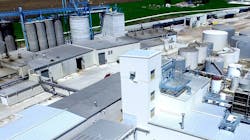Chevron Corp. subsidiary Chevron Renewable Energy Group Inc. (REG) is shuttering two of its US biodiesel production plants amid market challenges stemming from the US Environmental Protection Agency’s (EPA) Renewable Fuel Standard (RFS) program.
“Chevron REG has made the decision to indefinitely close our Ralston, Iowa, and Madison, Wis., biodiesel production facilities due to poor market conditions,” the operator told OGJ via e-mail on Mar. 6.
Noting the difficulty of the decision and pledging its support to employees impacted by the closures, Chevron REG reiterated it remains “committed to [the company’s] belief that the future of energy is lower carbon and [will continue to] advocate for supportive policy that will enable growth of the biofuels sector.”
Chevron REG did not reveal a definitive timeline for when the two biorefineries will cease operations.
The Madison plant—located in central Wisconsin—began operating in April 2007 and produces 20 million gal/year of biodiesel.
Located in central Iowa and commissioned in August 2002, the Ralston plant has a biodiesel production capacity of 30 million gal/year.
Chevron acquired the biorefineries after purchasing Iowa-based REG in June 2022 as part of Chevron’s broader aim to grow its renewable fuels production capacity to 100,000 b/d by 2030, as well as bring additional feedstock supplies and pretreatment infrastructure into its system (OGJ Online, June 13, 2022).
Chevron REG will continue to operate its nine remaining renewable fuels plants, including seven US plants and two in Germany.
RFS roots
While Chevron REG did not specifically reference the RFS for the plant shutdowns+, Iowa Biodiesel Board (IBB)—an independent organization founded by the Iowa Soybean Association (ISA) and regional producers to represent the state’s biodiesel industry—said on Mar. 1 the operator’s decision to close the Ralston plant came “as a result of weak biodiesel volumes under the federal RFS.”
“[T]he industry warned EPA about the possibility of plant closures when it set the [RFS] volume obligations well below our overall capacity,” said Grant Kimberley, IBB’s executive director.
Kimberley said values of renewable identification number (RIN) credits—the compliance mechanism used for the RFS program—"have suffered as predicted and that hurts the bottom line of biofuel plants.”
To increase biofuels use, EPA sets annual targets, called Renewable Volume Obligations (RVOs), for the amount of renewable fuels that must enter into the US fuel supply. Petroleum refiners and importers of motor gasoline and diesel comply either by blending biofuels into petroleum-based fuels or by purchasing RIN credits (OGJ Online, Oct. 24, 2023).
A US leader in biodiesel production and comprehensive pro-biodiesel state policies, Iowa is home to 10 remaining production plants, none of which have yet to announce any plans to go offline.
IBB and ISA said they will continue stressing the importance of state policies to help shield the biodiesel industry from concerns over uncertain federal policies like the RFS.
Iowa began enhanced state incentives for biodiesel in 2016, and according to the latest Iowa Department of Revenue data, the pure biodiesel gallons sold in Iowa have increased by almost 80% since 2016 to 64.3 million gallons in 2022, IBB said.
Despite the loss of Chevron REG’s plant, IBB remains hopeful ongoing discussions with federal regulators will lead to changes.
“[IBB] will continue to work with EPA to try to increase biodiesel blending requirements, which is clearly more in line with the Biden administration’s stated decarbonization goals,” Kimberley said.
“With improved profit margins, biodiesel producers with have healthier businesses and perhaps the Ralston plant would reopen, benefiting the Iowa economy and national decarbonization efforts alike,” Kimberley added.
About the Author
Robert Brelsford
Downstream Editor
Robert Brelsford joined Oil & Gas Journal in October 2013 as downstream technology editor after 8 years as a crude oil price and news reporter on spot crude transactions at the US Gulf Coast, West Coast, Canadian, and Latin American markets. He holds a BA (2000) in English from Rice University and an MS (2003) in education and social policy from Northwestern University.

